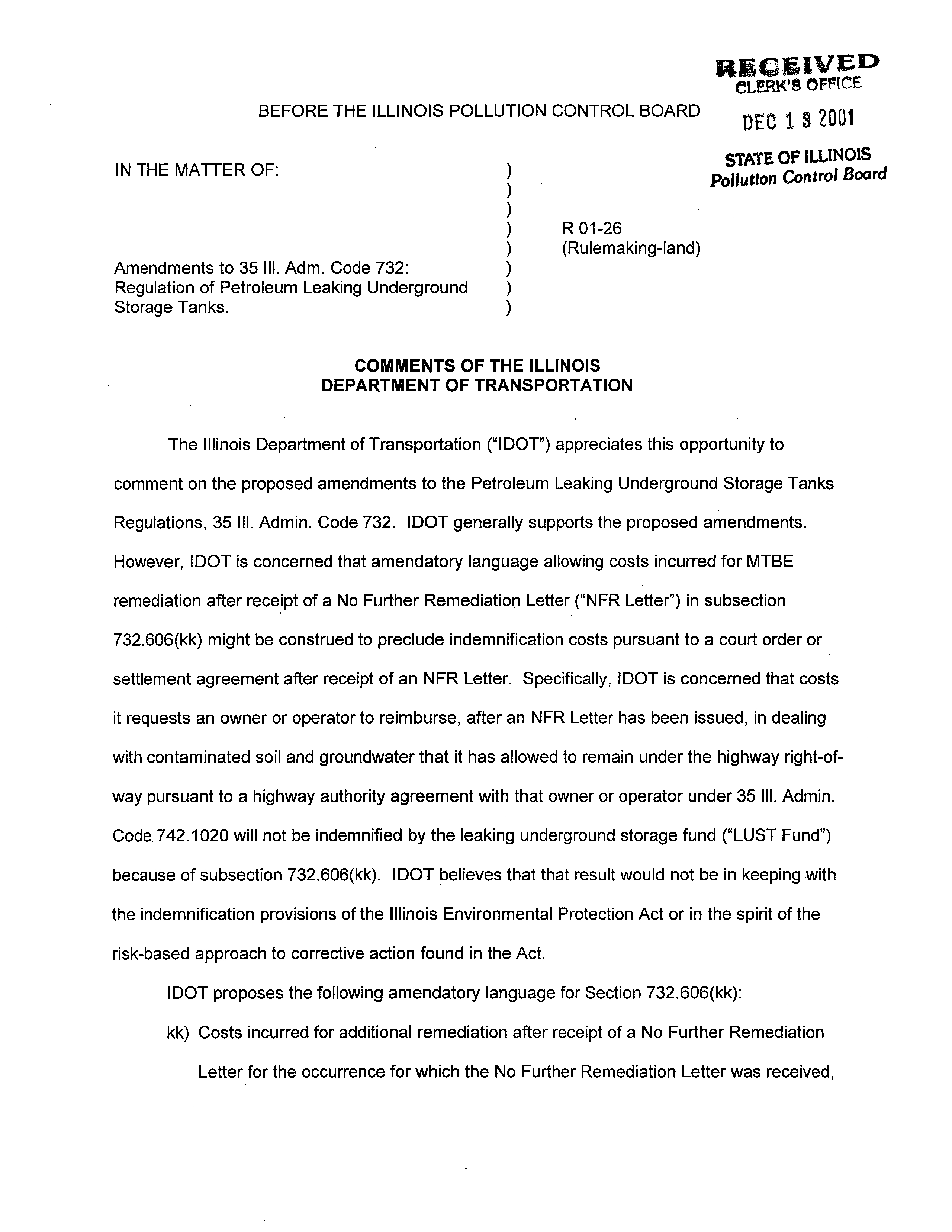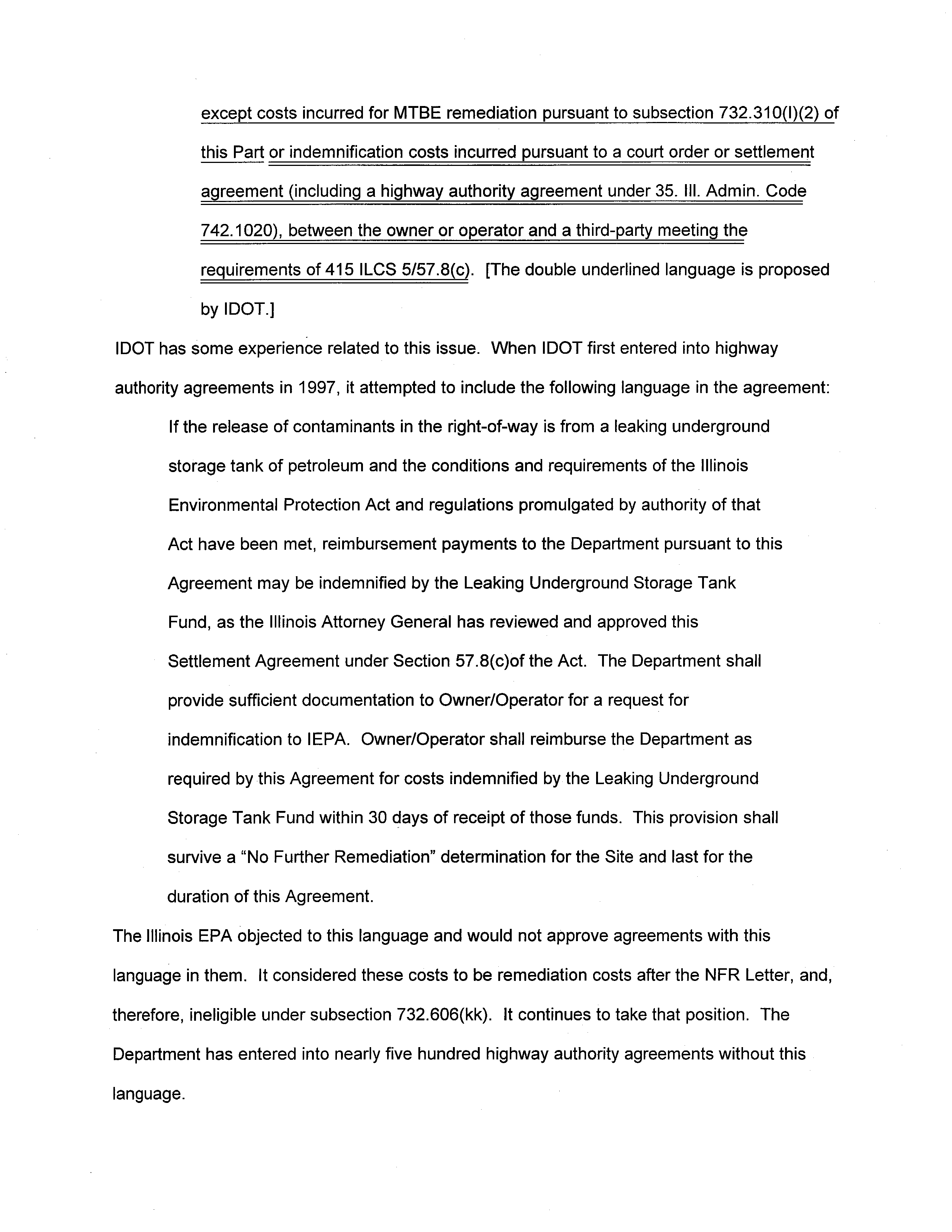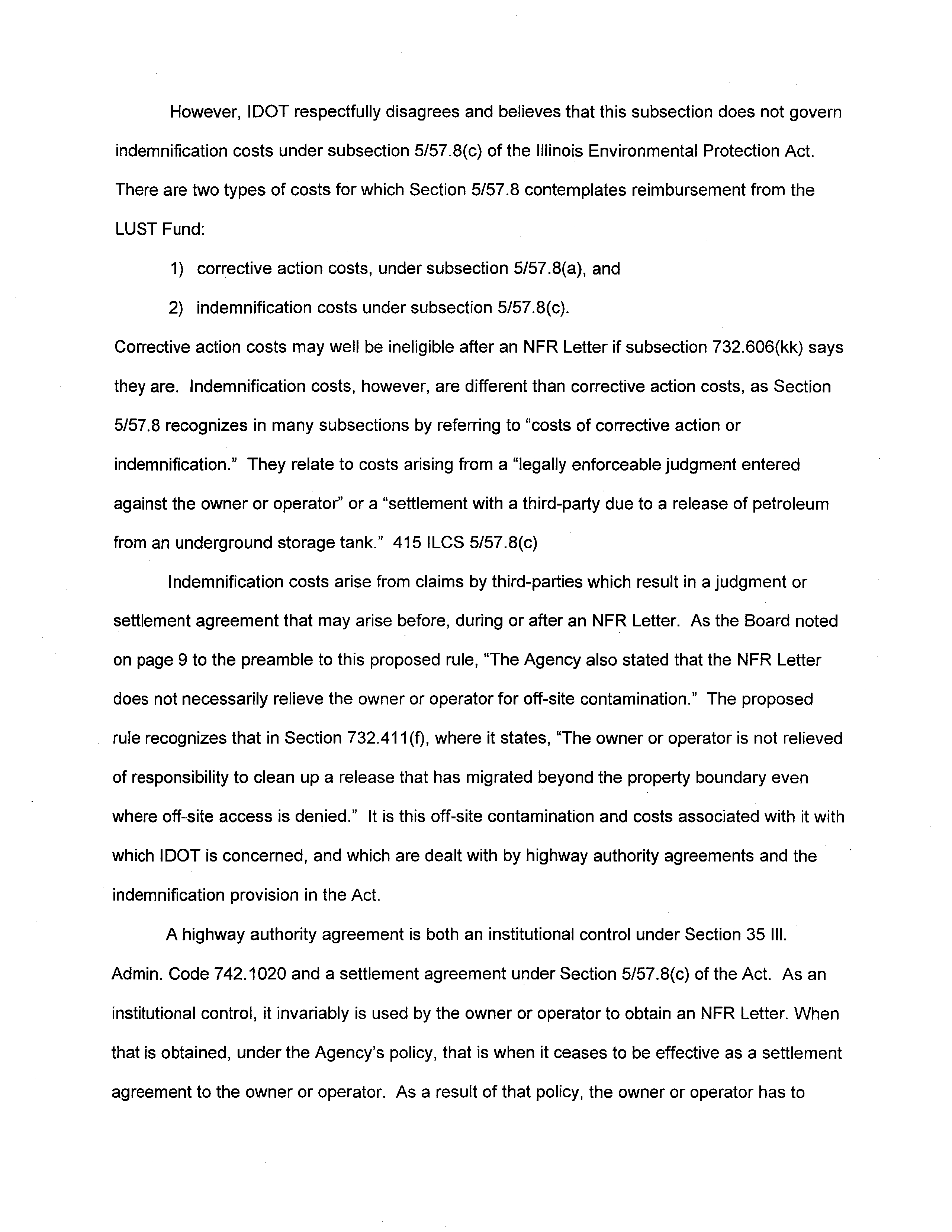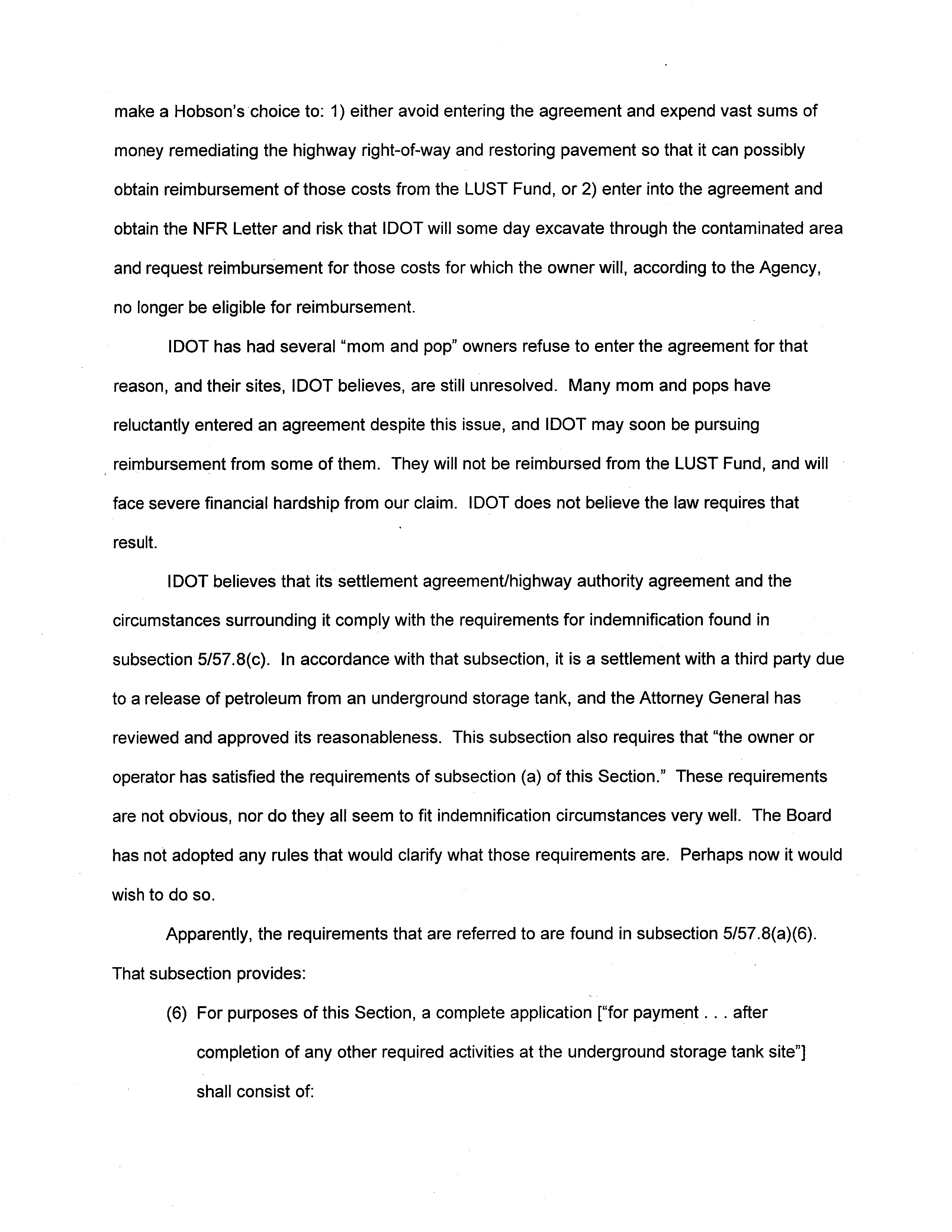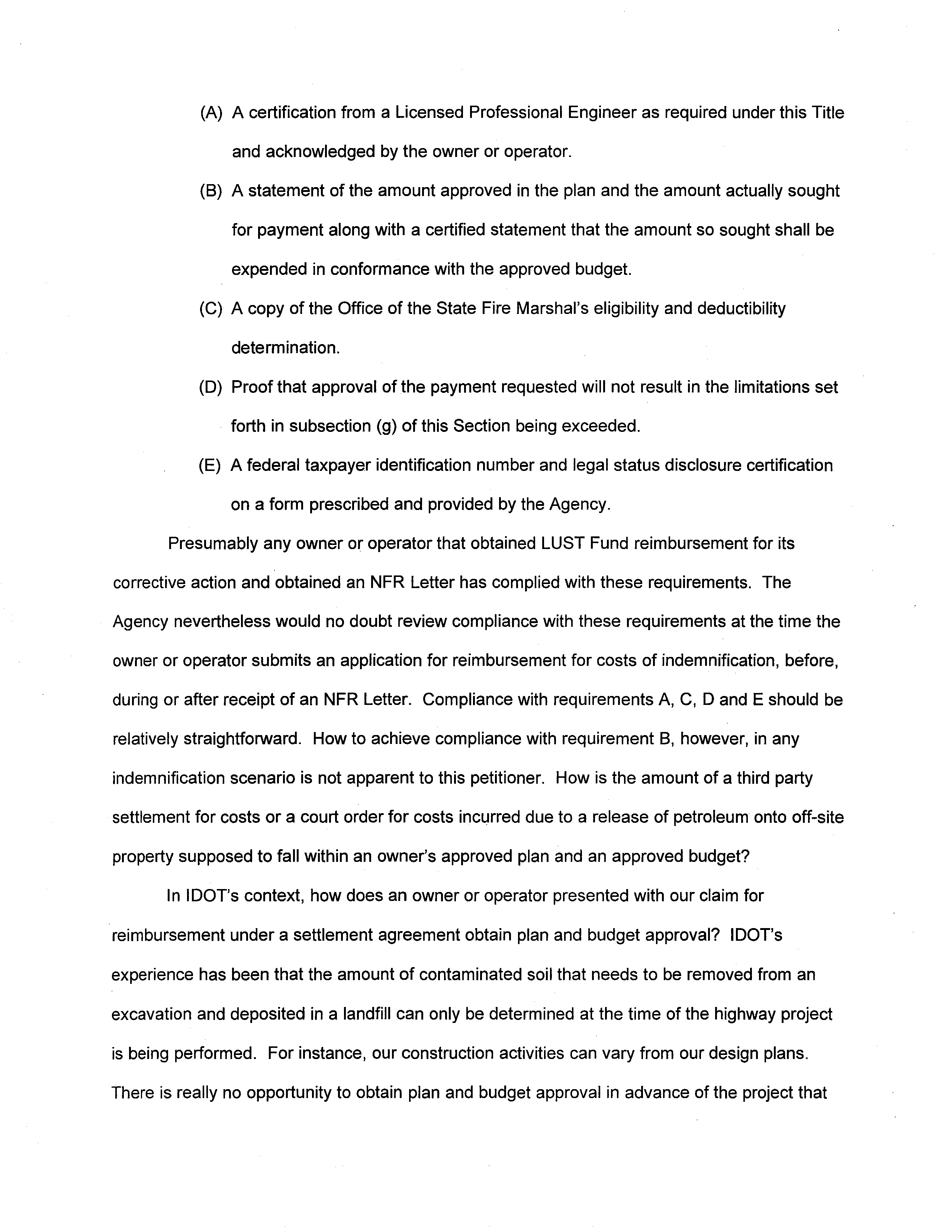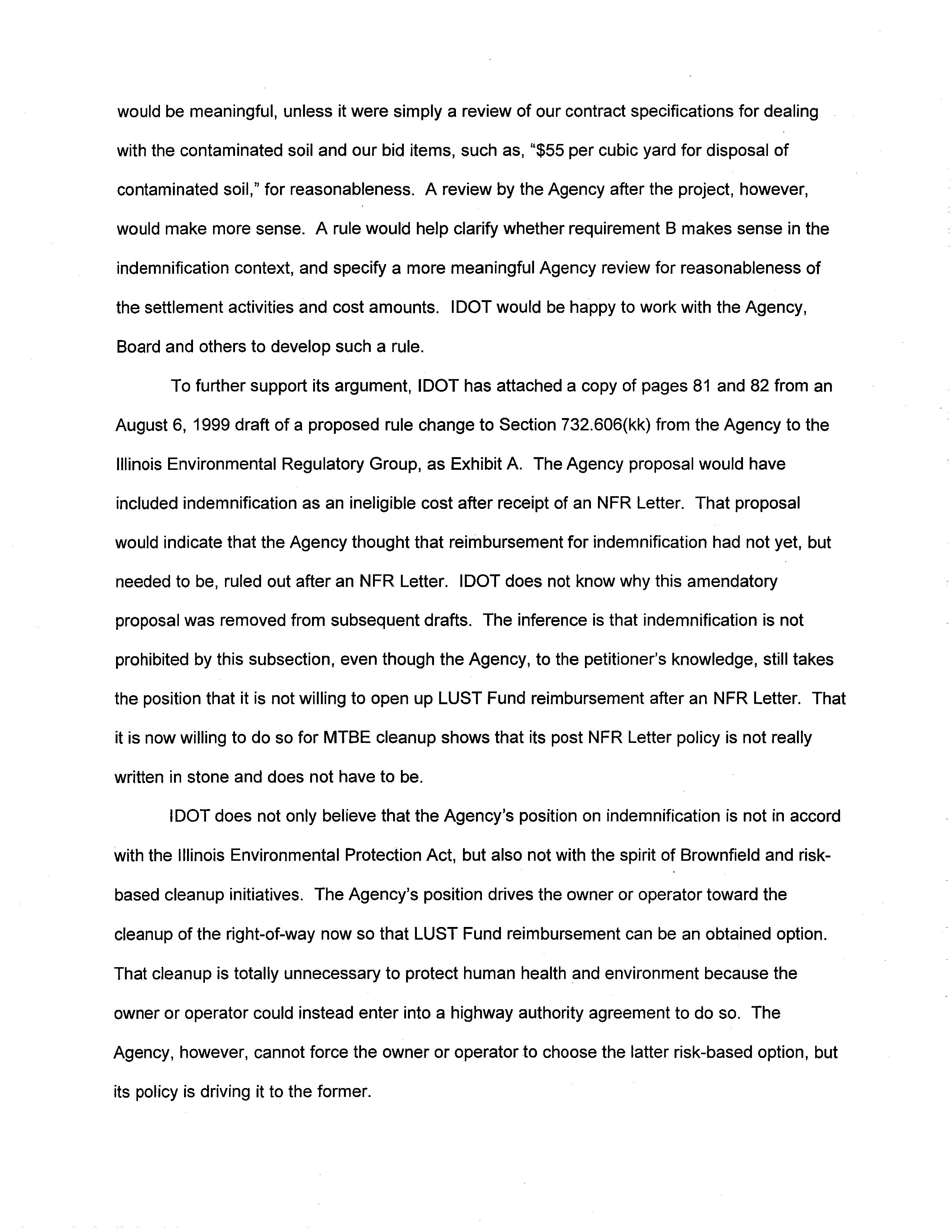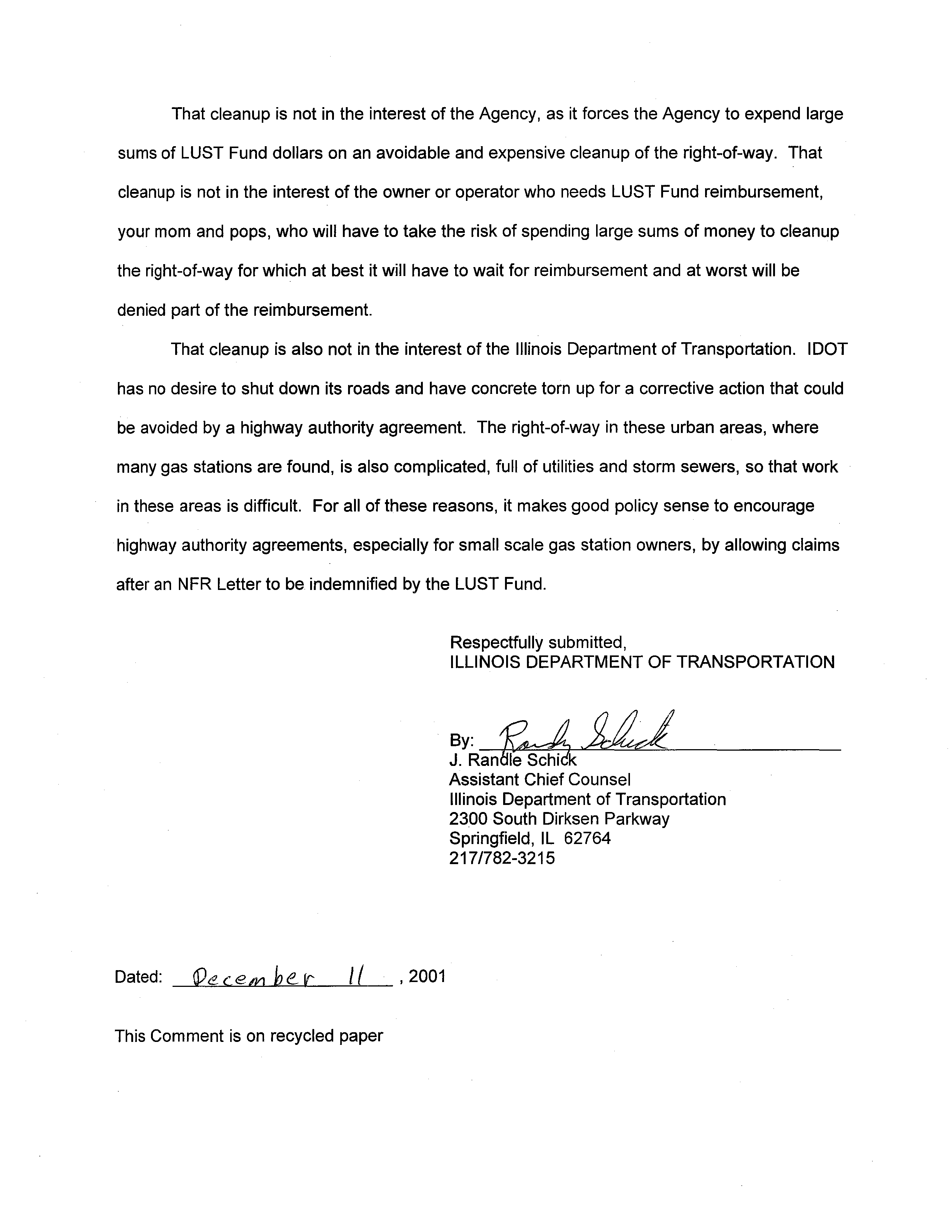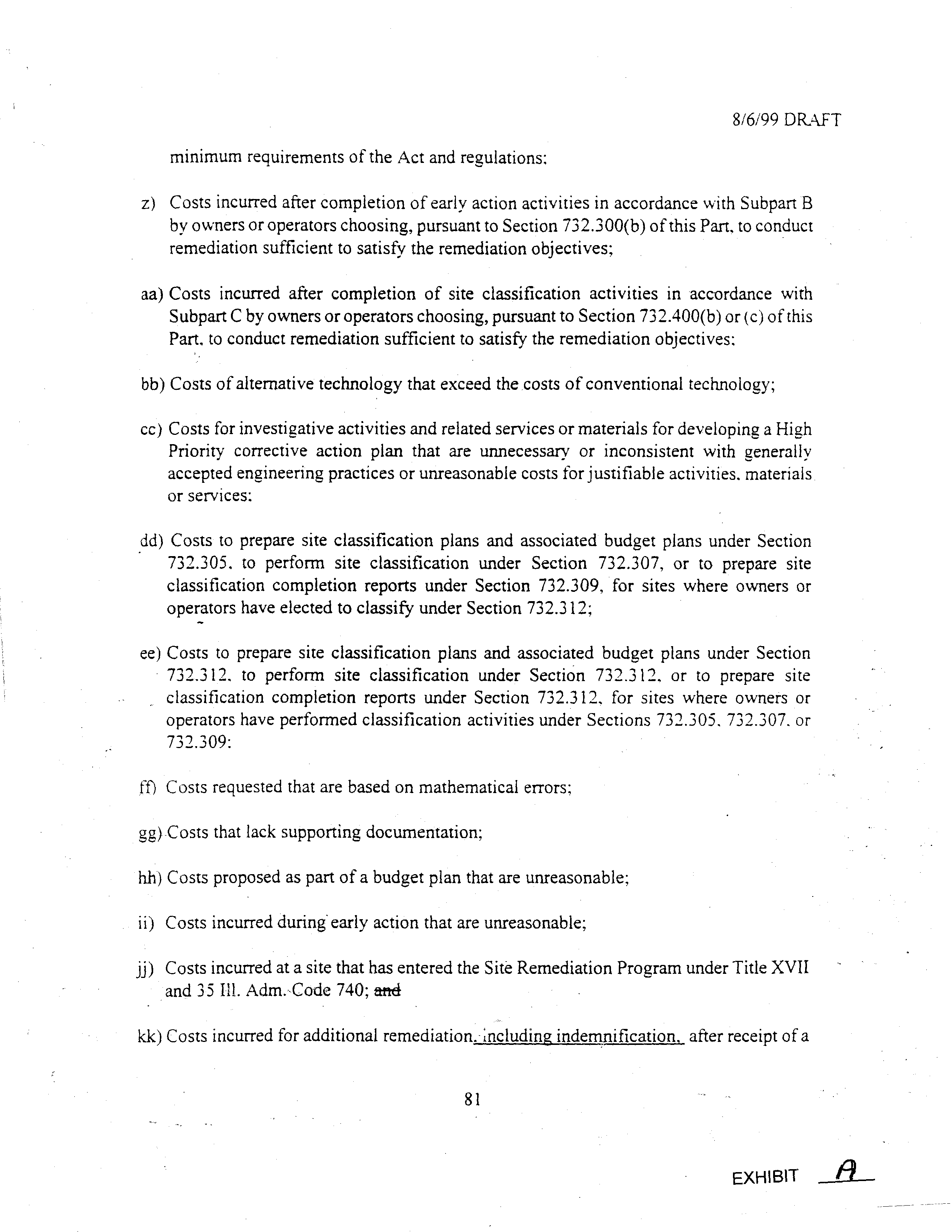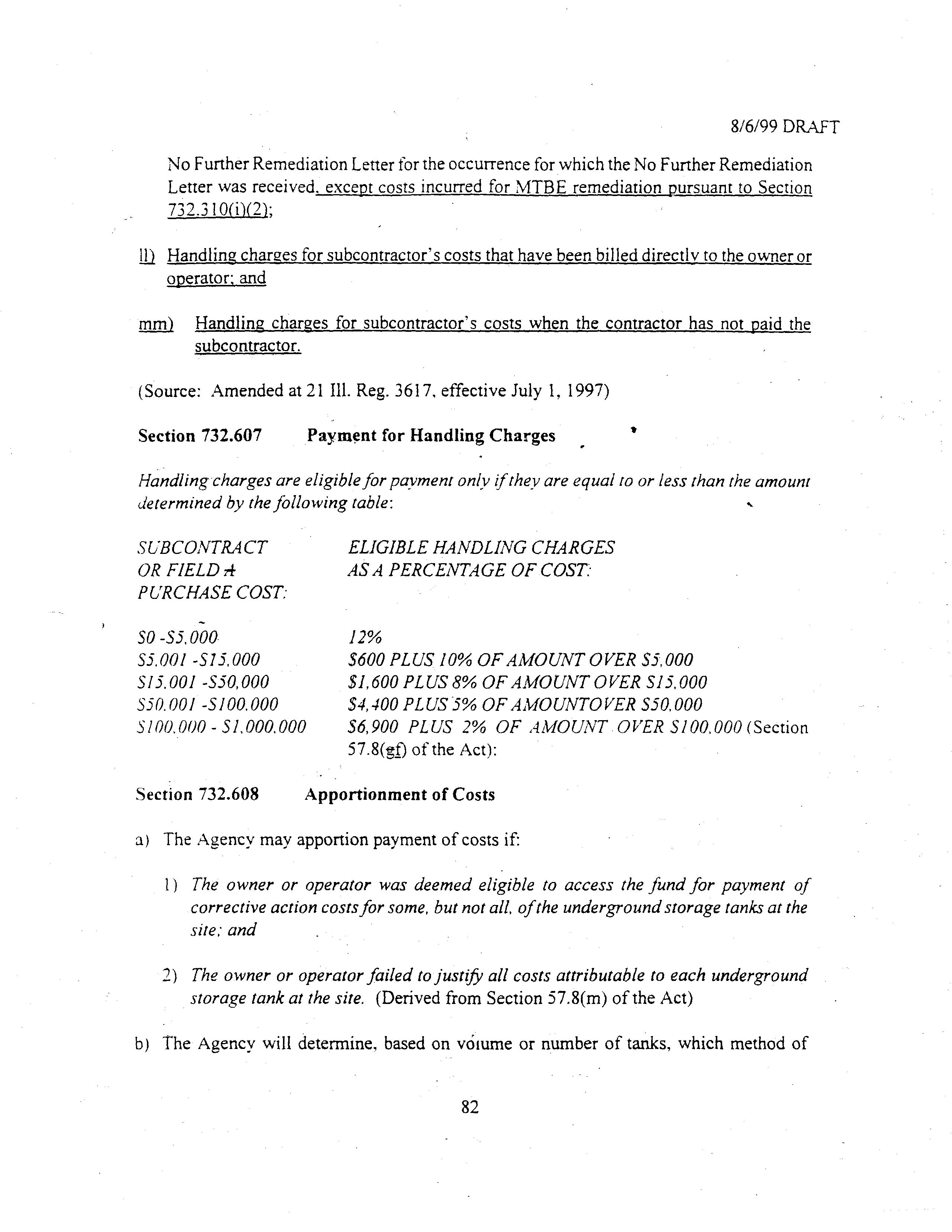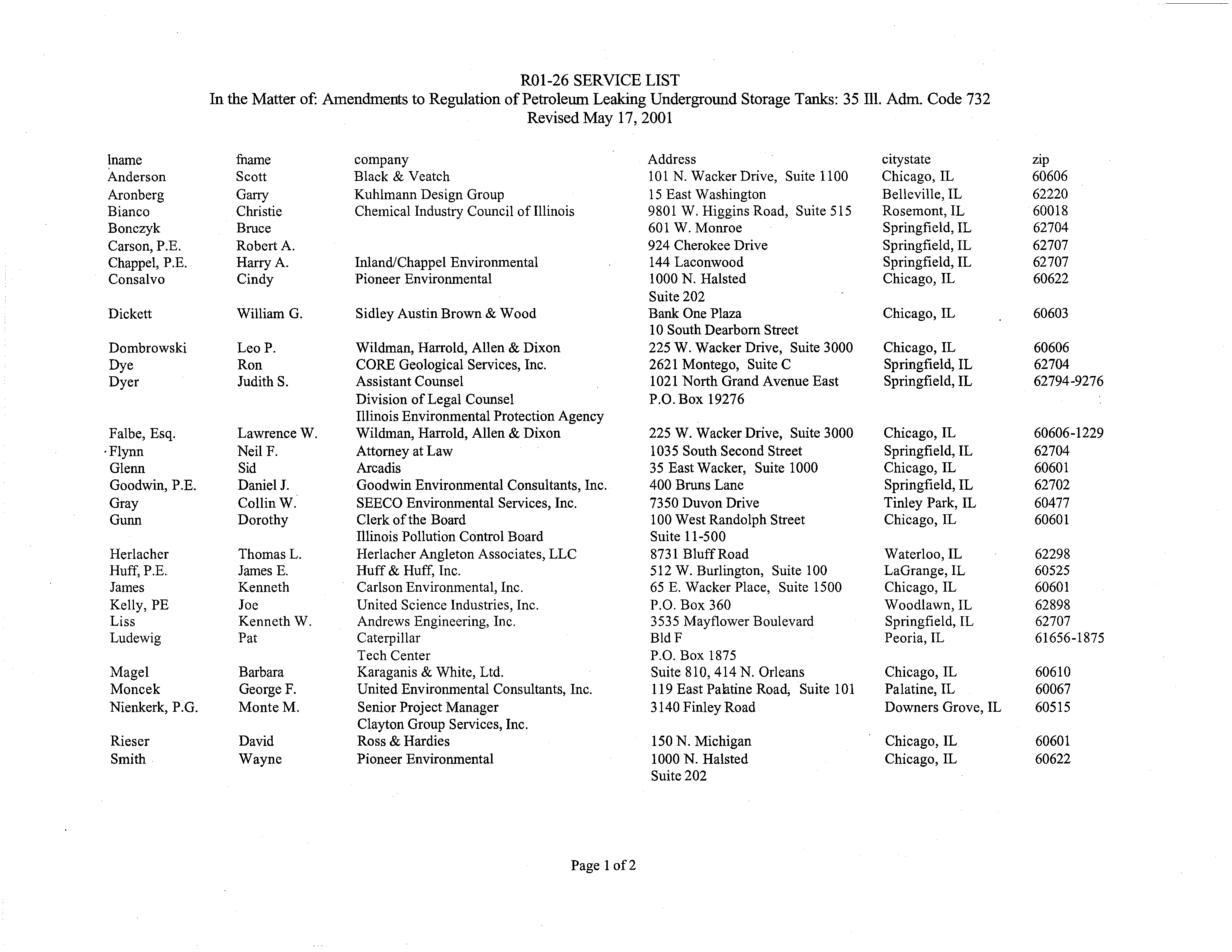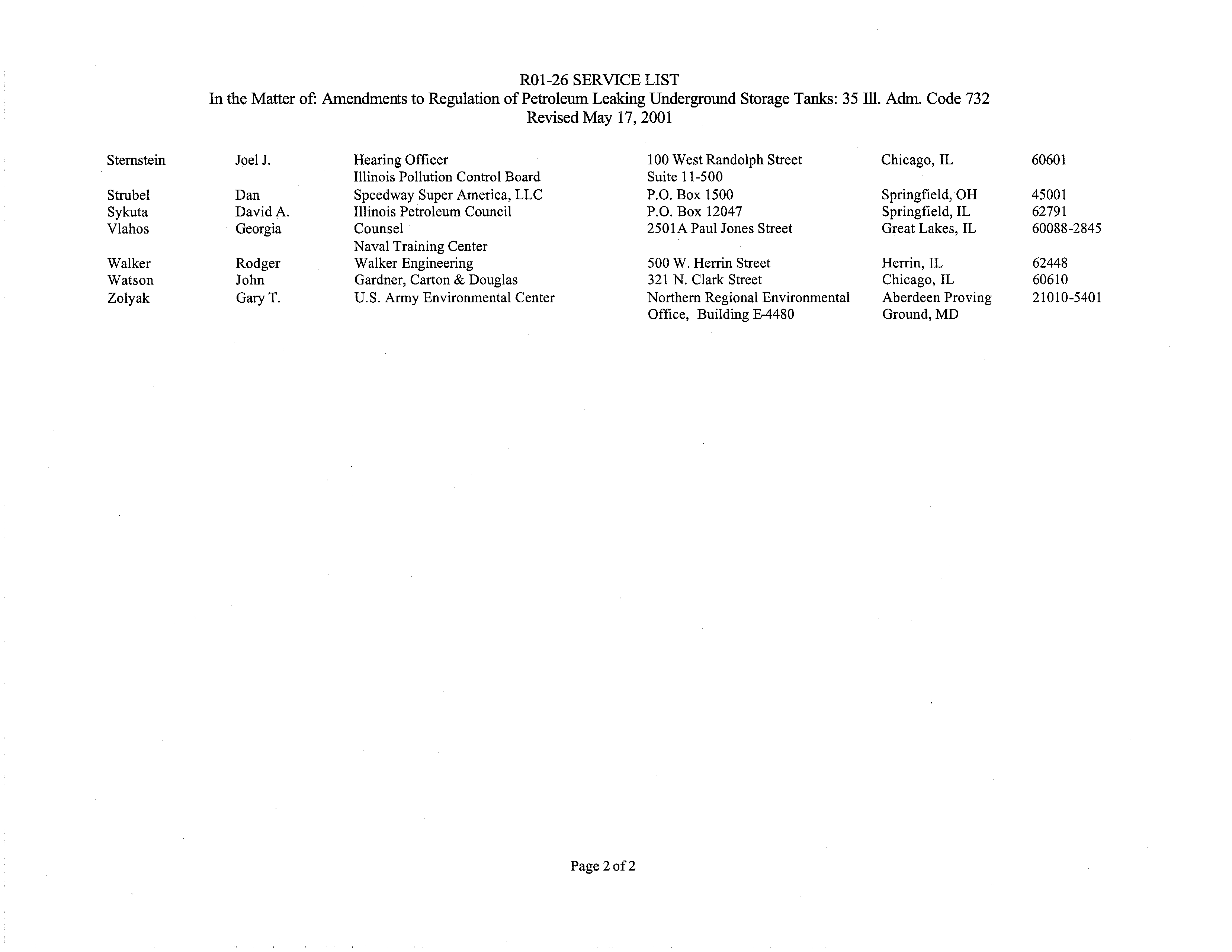IN THE
MATTER OF:
AMENDMENTS TO REGULATION
OF
PETROLEUM
LEAKING
UNDERGROUND
STORAGE TANKS
35
ILL.
ADM. CODE 732
NOTICE
OF FILING
RECEIVED
CLERK’S
OFFfCE
DEC
1
3
2001
STATE OF ILLINOIS
Pollution
Control Board
To:
See Attached
Service List
Dated:
~e~1~1
e
r
II
,2001
~~LJC
One otlts Attorneys
J.
Randle Schick
Assistant Chief Counsel
Illinois
Department of Transportation
2300 South
Dirksen Parkway
Springfield,
IL
217/782-3215
r
n
~
,
‘~
,~
‘~
~
BEFORE THE lLLIN~l~
~aL4JTION ~dNTROL BOARD
01-26
)
)
)
(Rulemaking
—
Land)
/e
.///
PLEASE TAKE NOTICE that
I
have today filed with the Office of the Clerk of the
Illinois
Pollution Control
Board Comments of the Illinois Department of Transportation on the
proposed
amendments to
Regulation
of Petroleum Leaking Underground
Storage Tanks.
THE
ILLINOIS
DEPARTMENT OF TRANSPORTATION
By:
This filing submitted
on
recycled paper
CLERK’S OFFICE
BEFORE THE
ILLINOIS POLLUTION
CONTROL BOARD
DEC
132001
STATE OF ILLINOIS
IN THE
MATTER OF:
Pollution
Control
Board
)
)
R01-26
)
(Rulemaking-land)
Amendments to 35
III. Adm.
Code 732:
)
Regulation of Petroleum Leaking Underground
)
Storage Tanks.
)
COMMENTS OF THE
ILLINOIS
DEPARTMENT OF TRANSPORTATION
The Illinois
Department of Transportation
(“IDOT”) appreciates this opportunity to
comment on the proposed amendments to
the Petroleum Leaking
Underground
Storage Tanks
Regulations, 35
III. Admin.
Code
732.
lOOT generally supports the proposed amendments.
However, IDOT is concerned that amendatory language
allowing costs incurred for MTBE
remediation after receipt
of a
No
Further Remediation
Letter (“N FR Letter”) in subsection
732.606(kk)
might be construed to
preclude indemnification costs pursuant to a court order or
settlement agreement after receipt of an NFR Letter.
Specifically,
IDOT is concerned that costs
it
requests an owner or operator to reimburse, after an
NFR Letter has
been
issued,
in dealing
with contaminated
soil and groundwater that it has allowed to
remain under the highway
right-of-
way pursuant to
a highway
authority agreement with that owner or operator under 35
III. Admin.
Code 742.1020 will not be
indemnified
by the leaking
underground storage fund (“LUST Fund”)
because of subsection
732.606(kk).
lOOT believes that that result would
not be in
keeping with
the indemnification provisions of the Illinois Environmental Protection Act or in the spirit of the
risk-based
approach to
corrective
action found
in the Act.
IDOT proposes the following amendatory language for Section 732.606(kk):
kk)
Costs incurred for additional
remediation after receipt of a No Further Remediation
Letter for the occurrence for which the No Further Remediation Letter was
received,
except costs incurred for MTBE
remediation pursuant to subsection 732.310(l)(2) of
this
Part or indemnification
costs incurred
pursuant to a
court order or settlement
agreement
(including a highway
authority agreement under 35.
III. Admin.
Code
742.1020),
between the owner or operator and a third-party meeting the
requirements
of 415
ILCS 5/57.8(c).
The
double
underlined language
is proposed
by
IDOT.
IDOT has
some experience related to
this issue.
When
IDOT first entered into highway
authority agreements in
1997,
it attempted to include the following language
in the agreement:
If the release
of contaminants in
the right-of-way is from
a
leaking underground
storage tank of petroleum
and the conditions and
requirements of the Illinois
Environmental
Protection Act and regulations promulgated
by authority of that
Act have
been
met, reimbursement payments
to the Department pursuant to
this
Agreement may
be indemnified
by the
Leaking
Underground Storage Tank
Fund,
as the Illinois Attorney General
has reviewed and
approved this
Settlement Agreement under Section 57.8(c)of the Act.
The Department shall
provide sufficient documentation
to Owner/Operator for a
request for
indemnification
to
IEPA.
Owner/Operator shall reimburse the Department as
required by
this Agreement for costs indemnified
by the
Leaking
Underground
Storage Tank Fund within
30 days
of receipt of those funds.
This provision
shall
survive
a
“No Further Remediation” determination for the Site and
last for the
duration of this Agreement.
The Illinois
EPA objected to this language and would
not approve agreements with this
language
in them.
It considered these
costs
to be
remediation costs
after the NFR Letter,
and,
therefore,
ineligible under subsection 732.606(kk).
It continues to take that position.
The
Department has
entered into nearly five hundred highway authority agreements without this
language.
However,
IDOl respectfully disagrees and
believes that this subsection does not govern
indemnification costs
under subsection 5/57.8(c) of the Illinois
Environmental Protection Act.
There are two types of costs for which Section 5/57.8
contemplates reimbursement from the
LUST Fund:
1)
corrective
action costs,
under subsection
5/57.8(a), and
2)
indemnification
costs under subsection
5/57.8(c).
Corrective action
costs
may well be
ineligible after an
NFR Letter if subsection 732.606(kk) says
they are.
Indemnification
costs,
however, are different than
corrective action costs,
as Section
5/57.8
recognizes
in
many subsections by referring to “costs of corrective action or
indemnification.”
They relate to costs
arising from a “legally enforceable judgment entered
against the owner or operator” or a “settlement with a third-party
due to
a release of petroleum
from
an
underground storage
tank.”
415 ILCS 5/57.8(c)
Indemnification costs
arise from claims by third-parties which result in
a judgment or
settlement
agreement that
may arise before,
during or after an NFR Letter.
As the Board
noted
on
page 9 to the preamble to
this proposed
rule, “The Agency also
stated that the NFR Letter
does
not necessarily relieve the owner or operator for off-site
contamination.”
The proposed
rule recognizes that
in
Section 732.411 (f), where it states, “The owner or operator is not relieved
of responsibility to clean
up
a release that has
migrated beyond the property boundary
even
where off-site access
is denied.”
It is this off-site
contamination and costs associated with
it with
which IDOT is concerned,
and which are dealt with
by highway authority agreements and
the
indemnification
provision
in the Act.
A highway authority
agreement is both
an
institutional control under Section
35
III.
Admin.
Code 742.1020 and a settlement agreement under Section
5/57.8(c) of the Act.
As an
institutional control,
it invariably is used
by the owner or operator to obtain
an NFR Letter. When
that
is obtained, under the Agency’s policy,
that is when it ceases to
be effective as a settlement
agreement to the owner or operator.
As a result of that policy, the owner or operator has to
make a
Hobson’s choice to:
1) either avoid entering the agreement and expend vast sums of
money remediating the highway right-of-way and
restoring pavement so that it can possibly
obtain reimbursement of those costs from the LUST Fund, or 2) enter
into the agreement and
obtain the NFR Letter and
risk that IDOT will some day excavate through the contaminated area
and request
reimbursement for those
costs for which the ownerwill, according
to
the Agency,
no
longer be eligible for reimbursement.
IDOl
has had
several “mom
and
pop” owners refuse
to enter the agreement for that
reason,
and their sites,
IDOT believes,
are still
unresolved.
Many
mom and
pops have
reluctantly entered an agreement despite this issue,
and
IDOT may soon be pursuing
reimbursement from some of them.
They will not be
reimbursed from the LUST Fund,
and will
face severe financial
hardship from our claim.
lOOT does not believe the
law requires that
result.
lOOT believes that its settlement agreement/highway authority agreement and the
circumstances surrounding it comply with the requirements for indemnification found
in
subsection 5/57.8(c).
In accordance with that subsection,
it is a settlement with a third party due
to a release of petroleum from an
underground storage tank,
and the Attorney General has
reviewed and
approved its
reasonableness.
This subsection also
requires that “the owner or
operator has
satisfied the requirements of subsection
(a) of this Section.”
These requirements
are
not obvious, nor do they
all seem
to fit indemnification
circumstances very well.
The Board
has not adopted any rules
that would clarify what those
requirements are.
Perhaps now
it would
wish
to do so.
Apparently, the requirements that are referred to are found
in
subsection
5157.8(a)(6).
That subsection provides:
(6)
For purposes
of this Section, a complete application
“for
payment.
.
.
after
completion
of any other required activities
at
the underground storage tank site”
shall consist of:
(A)
A certification from a
Licensed
Professional
Engineer as required
under this Title
and
acknowledged by the owner or operator.
(B)
A statement of the amount approved
in the plan and the amount actually sought
for payment along
with a
certified statement
that the amount
so sought shall
be
expended in conformance with the approved
budget.
(C)
A copy of the Office of the State Fire Marshal’s eligibility
and deductibility
determination.
(D)
Proof that approval
of the payment requested will not result
in the limitations set
forth
in
subsection (g) of this Section being
exceeded.
(E)
A federal taxpayer identification number and
legal status disclosure certification
on
a form prescribed and provided
by the Agency.
Presumably any owner or operator that obtained
LUST Fund reimbursement for its
corrective
action and obtained an NFR Letter has
complied with these requirements.
The
Agency
nevertheless would no doubt
review compliance with these
requirements
at the time the
owner or operator submits an
application for
reimbursement for costs of indemnification,
before,
during
or after receipt of an
NFR Letter.
Compliance with
requirements
A,
C, 0 and
E should
be
relatively straightforward.
How to achieve
compliance with requirement
B,
however,
in any
indemnification
scenario is not apparent to this petitioner.
How is the amount of a third party
settlement for costs or a court order for costs incurred due to
a release
of petroleum
onto off-site
property supposed to fall within an
owner’s approved plan
and
an approved
budget?
In
IDOT’s
context,
how does an owner or operator presented with our claim for
reimbursement under a settlement agreement obtain plan
and budget approval?
IDOT’s
experience has
been that the amount of contaminated soil that needs to be removed
from an
excavation and deposited
in a
landfill can only
be determined
at the time of the highway project
is being
performed.
For instance,
our construction activities
can vary from our design plans.
There is really
no opportunity to obtain plan
and budget approval
in advance of the project that
would be
meaningful, unless it were simply a review of our contract specifications for dealing
with the contaminated soil and our bid
items,
such as,
“$55 per cubic yard for disposal of
contaminated soil,”
for reasonableness.
A review by the Agency after the project,
however,
would make more sense.
A rule would
help clarify whether requirement
B makes sense in
the
indemnification
context, and
specify a
more meaningful Agency review for reasonableness of
the settlement activities and cost amounts.
IDOT would
be happy to work with the Agency,
Board and others to
develop such a
rule.
To
further support its argument,
IDOT
has attached a copy
of pages 81
and 82 from
an
August 6,
1999 draft of a proposed
rule change
to Section 732.606(kk) from the Agency to
the
Illinois Environmental Regulatory
Group, as Exhibit A.
The Agency
proposal would
have
included indemnification as an
ineligible cost after receipt of an
NFR Letter.
That proposal
would indicate that the Agency thought that reimbursement for indemnification had
not yet,
but
needed to
be,
ruled
out after an NFR Letter.
IDOT does
not know why this amendatory
proposal was removed from
subsequent drafts.
The inference is that indemnification is not
prohibited
by this subsection, even though the Agency, to the petitioner’s
knowledge, still
takes
the position that it is not willing to open up
LUST Fund
reimbursement after an
NFR Letter.
That
it is now willing to do so for MTBE
cleanup shows that
its post NFR Letter policy is not really
written
in stone and
does not have
to be.
lOOT does
not only believe
that the Agency’s position on
indemnification is not in
accord
with the Illinois
Environmental Protection Act,
but also
not with the spirit of Brownfield and risk-
based cleanup initiatives.
The Agency’s position drives the owner or operator toward the
cleanup of the right-of-way now so that LUST Fund reimbursement
can
be an
obtained option.
That cleanup is totally unnecessary
to
protect human health and environment
because the
owner or operator could instead enter into a highway
authority agreement to do
so.
The
Agency,
however, cannot force the owner or operator to choose the latter risk-based option,
but
its policy is driving
it
to the former.
That cleanup is not in the interest of the Agency,
as it forces the Agency to expend
large
sums of LUST Fund dollars on an
avoidable and expensive cleanup of the right-of-way.
That
cleanup
is not
in the interest of the owner or operator who needs LUST Fund
reimbursement,
your mom
and
pops, who will have to take the risk of spending large
sums of money to cleanup
the right-of-way for which
at
best it will have to wait
for reimbursement and
at worst will be
denied
part of the reimbursement.
That cleanup is also not in the interest of the Illinois
Department of Transportation.
lOOT
has no desire to
shut down
its roads and
have concrete torn up for a corrective action
that could
be
avoided by
a
highway authority agreement.
The right-of-way in these urban areas, where
many gas
stations are found,
is also complicated,
full of utilities and storm sewers,
so that work
in these
areas
is difficult.
For all of these reasons,
it makes good
policy sense to encourage
highway authority agreements, especially for small scale gas
station owners,
by allowing claims
after
an
NFR Letterto be
indemnified by the LUST
Fund.
Respectfully submitted,
ILLINOIS
DEPARTMENT OF TRANSPORTATION
By:
~
~LJ
J.
Ran
le Schi
k
Assistant Chief Counsel
Illinois Department
of Transportation
2300 South Dirksen Parkway
Springfield,
IL
62764
217/782-3215
Dated:
~
j9e~r~
if
,2001
This Comment is on
recycled paper
8/6199
DRAFT
minimum requirements of the
Act and regulations:
z)
Costs incurred after completion ofearly action activities in accordance with Subpart
B
by owners or operators choosing, pursuant to
Section 732.300(b) ofthis Part, to conduct
remediation sufficient to satisfy the remediation objectives;
aa) Costs
incurred
after
completion
of
site
classification
activities
in
accordance
with
Subpart C by owners oroperators choosing, pursuant to Section
73 2.400(b) or (c) of this
Part,
to conduct remediation sufficient to satisfy
the remediation objectives:
bb) Costs ofalternative technology that exceed the costs ofconventional technology;
cc)
Costs forinvestigative activities and related services ormaterials for developing
a High
Priority
corrective
action
plan
that
are
unnecessary
or
inconsistent
with
generally
accepted engineering practices or unreasonable costs for justifiable activities, materials
or services:
dd) Costs
to
prepare site classification plans
and
associated
budget
plans
under
Section
732.305.
to
perform
site
classification
under
Section
732.307,
or
to
prepare
site
classification
completion
reports
under
Section
732.309,
for
sites
where
owners
or
operators have elected to classify under Section 732.3 12;
ee) Costs
to
prepare site classification
plans
and
associated
budget
plans
under
Section
732.3
12.
to
perform
site
classification
under
Section
732.312.
or
to
prepare
site
classification
completion
reports
under
Section
732.3 12.
for
sites
where
owners
or
operators have performed classification
activities under Sections 732.305. 732.307.
or
732.309:
ff)
Costs requested that are based on mathematical
errors:
gg)~Costs
that lack supporting documentation;
hh) Costs proposed as part of a budget plan that are unreasonable;
ii)
Costs incurred during’ early action that are unreasonable;
jj)
Costs incurredat a site that has entered the Site Remediation Program under Title XVII
and 35
Iii. Adm.~Code
740; ~4
kk) Costs incurred for additional
remediation.ncluding indenmnification.
after receipt ofa
81
EXHI BIT
8/6/99
DRAFT
No Further Remediation Letter for the occurrence for which the No Further Remediation
Letter was received, except costs
incurred for MTBE remediation~pursuant
to
Section
732.3 10(i)(2~
ill
Handlin,g charges for subcontractor’s costs that have been billed directly to the owneror
operator:
and
~
Handling
charges
for subcontractor’s costs
when
the contractor has
not
paid
the
subcontractor.
(Source:
Amended at 21111.
Reg.
3617, effective July
1,
1997)
Section 732.607
Payment for
Handling Charges
Handling charges are eligiblefor payment only ifthey are equal to or less than the amount
determined by thefollowing table:
SUBCONTRA CT
OR FIELD
24’
PURCHASE COST;
SO -55,000
S5.00l -575000
515.001
-S50,000
S50.001
-5100.000
5/00,000
-
S1.000,000
Section 732.608
ELJGIBLE HANDLING CHARGES
ASA PERCENTAGE OF COST
12
$600 PLUS 10
OFAMOUNT OVER $5,000
$1,600 PL US 8
OFAMOUNTOVER S15,000
$4,400 PL US 5
OFAMOUNTO VER 550,000
S6,900
PLUS
2
OF AMOUNT
OVER
5/00000
(Section
57.8(gf) ofthe
Act):
Apportionment of Costs
a)
The Agency may apportion payment of costs if:
1)
The
owner
or operator
was deemed eligible
to
access
the fund for
payment
of
corrective action costsfor some,
but not all, ofthe underground storage tanks at the
site,’ and
2)
The
owner or operator failed to jusr~j5iall costs
attributable
to
each underground
storage tank at the site.
(Derived from Section
5 7.8(m) ofthe Act)
b)
The Agency
will
determine, based on
voiume
or number of tanks,
which
method
of
82
R01-26
SERVICE LIST
In the Matter of:
Amendments to Regulation of
Petroleum Leaking Underground
Storage
Tanks:
35
Iii.
Adm.
Code 732
Revised May 17,
2001
Liss
Kenneth W.
Ludewig
Pat
company
Black & Veatch
Kuhlmann Design Group
Chemical Industry Council of Illinois
Inland/Chappel Environmental
Pioneer Environmental
Sidley Austin Brown & Wood
Division of Legal Counsel
Illinois Environmental Protection Agency
Wildman, Harrold,
Allen& Dixon
Attorneyat Law
Arcadis
Goodwin Environmental Consultants, Inc.
SEECO Environmental
Services, Inc.
Clerk ofthe Board
Illinois Pollution Control Board
Herlacher Angleton Associates, LLC
Huff & Huff, Inc.
Carison Environmental, Inc.
United Science Industries, Inc.
Andrews
Engineering,
Inc.
Caterpillar
Tech Center
Karaganis
& White, Ltd.
United Environmental Consultants, Inc.
Senior Project Manager
Clayton Group Services, Inc.
Ross & Hardies
Pioneer Environmental
Address
101
N. WackerDrive,
Suite
1100
15 East Washington
9801 W. Higgins
Road,
Suite
515
601
W. Monroe
924
Cherokee Drive
144
Laconwood
1000
N. Halsted
Suite 202
Bank OnePlaza
10
South Dearborn Street
225
W. Wacker Drive,
Suite 3000
2621 Montego,
Suite
C
1021 North Grand Avenue East
P.O. Box
19276
225 W. WackerDrive,
Suite 3000
1035
South Second Street
35
East Wacker,
Suite
1000
400 Bruns Lane
7350 Duvon Drive
100 West Randolph Street
Suite 11-500
8731
BluffRoad
512 W. Burlington,
Suite
100
65 E. Wacker Place,
Suite
1500
P.O.
Box
360
3535
Mayflower Boulevard
BldF
P.O. Box
1875
150 N. Michigan
1000 N. Halsted
Suite 202
lname
Anderson
Aronberg
Bianco
Bonczyk
Carson, P.E.
Chappel,
P.E.
Consalvo
fhame
Scott
Gany
Christie
Bruce
Robert A.
Harry A.
Cindy
Dickett
William
G.
citystate
Chicago,
IL
Belleville, IL
Rosemont, IL
Springfield, IL
Springfield, IL
Springfield, IL
Chicago,
IL
Wildman, Harrold,
Allen& Dixon
CORE Geological Services, Inc.
Assistant Counsel
zip
60606
62220
60018
62704
62707
62707
60622
Dombrowski
Dye
Dyer
Falbe,
Esq.
~Fly~.i’i
Glenn
Goodwin, P.E.
Gray
Gunn
Herlacher
Huff, P.E.
James
Kelly,
PE
Leo P.
Ron
Judith S.
Lawrence W.
Neil F.
Sid
DanielI.
Collin W.
Dorothy
ThomasL.
JamesE.
Kenneth
Joe
Chicago,
IL
,
60603
Magel
Moncek
Nienkerk, P.G.
Barbara
George F.
Monte M.
Chicago,
IL
Springfield, IL
Springfield, IL
Chicago,
IL
Springfield, IL
Chicago,
IL
Springfield, IL
Tinley Park, IL
Chicago,
IL
Waterloo,
IL
LaGrange, IL
Chicago, IL
Woodlawn, IL
Springfield, IL
Peoria, IL
Chicago, IL
Palatine, IL
Downers Grove, IL
Chicago,
IL
Chicago, IL
Rieser
David
Smith
Wayne
60606
62704
62794-9276
60606-1229
62704
60601
62702
60477
60601
62298
60525
60601
62898
62707
61656-1875
60610
60067
60515
60601
60622
Suite
810, 414 N. Orleans
119 East Pahtine Road,
Suite
101
3140 Finley Road
Page
1 of2
R01-26
SERVICE LIST
In
the
Matter of:
Amendments to Regulation of Petroleum Leaking Underground Storage Tanks:
35
111.
Adm.
Code
732
Revised May
17, 2001
Hearing Officer
Illinois Pollution Control Board
Speedway Super America, LLC
Illinois
Petroleum Council
Counsel
Naval Training Center
Walker
Engineering
Gardner, Carton & Douglas
U.S. Army Environmental Center
100 West Randolph Street
Suite
11-500
P.O. Box
1500
P.O. Box
12047
250lA Paul Jones Street
500 W. Herrin Street
321
N. Clark
Street
Northern
Regional Environmental
Office,
Building E-4480
62448
60610
21010-5401
Sternstein
Joel J.
Strubel
Sykuta
Vlahos
Walker
Watson
Zolyak
Dan
David A.
Georgia
Rodger
John
GaiyT.
Chicago, IL
60601
45001
62791
60088-2845
Springfield, OH
Springfield, IL
Great Lakes,
IL
Herrin, IL
Chicago, IL
Aberdeen Proving
Ground, MD
Page 2 of 2


